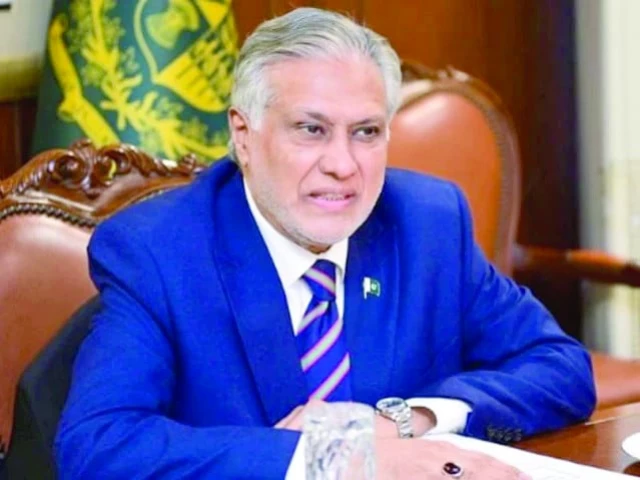Islamabad:
Deputy Prime Minister and Foreign Minister Ishaq Dar said Friday that Pakistan was obliged to the ceasefire with India and called on the international community to facilitate a decision on the long -standing Kashmir.
In an address of the 32nd ASEAN Regional Forum (ARF) in Kuala Lumpur, Dar strongly criticized India for creating regional tensions, especially the situation in Jammu and Kashmir.
His speech highlighted unresolved disputes, cross-border hostilities and India’s suspension of the Indus Waters Treaty and warned that regional peace remains in danger without international attention and mediation.
Dar described South Asia as a region plagued by sustained security challenges, noting that Jammu and Kashmir -Twist are “in the heart of regional instability”.
He confirmed Pakistan’s call for a peaceful decision in accordance with the decisions of the United Nations Security Council and Kashmiri’s wishes.
Referring to an attack in Pahagam on April 22, he said India had blamed Pakistan without any strip of evidence. He said Pakistan had proposed an independent study on April 26, but that India “chose aggression” instead of launching an unprovoked strike on May 7, resulting in civilian losses and infrastructure damage.
Deputy Prime Minister defended Pakistan’s military reaction on May 7 and 10 as a calibrated and maintained the exercise of his right to self-defense in accordance with Article 51 of the UN Charter, which targeted only military assets.
He said that Pakistan’s answer was to maintain sovereignty and deter further aggression and reject what he called India’s “so -called new normal”, which is rooted in enidia and impunity.
He further criticized India’s unilateral steps to keep the Indus Waters Treaty in Abeyance and called it a violation of international law and a threat to millions that depend on the Indus River system. “The Treaty contains no provision of unilateral action,” he emphasized, calling on the international community to notice what he called a dangerous precedent.
When he repeated Pakistan’s commitment to the ceasefire with India, he expressed the appreciation of international partners who facilitated it and welcomed their offer to help solve Kashmir -twist.
“Over a fifth of humanity is a resident of South Asia. Another conflict cycle would be disastrous for the region,” he warned.
In addition to regional tensions, the Deputy Prime Minister also dealt with global concerns, including terrorism, rising Islamophobia, the Israeli-Palestinian crisis, Afghanistan, climate change and maritime security.
He said Pakistan had lost over 80,000 lives and suffered financial losses of over $ 150 billion in the fight against terrorism and adopted a comprehensive approach that includes counter -radicalization, educational reforms and intelligence coordination. However, he warned that the root causes of terrorism such as poverty, injustice, occupation and denial of self -determination must also be treated.
DAR expressed concern about the instrumentalization of the rhetoric of terrorism to stigmatize Muslim communities and condemned rising Islamophobic policies. “Such tales erode fundamental rights and aggravate radicalization.”
He approached Afghanistan and highlighted Pakistan’s recent efforts to strengthen the dialogue, including his visit to April in Kabul and a trilateral meeting with China and Afghanistan in May. He urged the Afghan temporary government to prevent the use of its territory to terrorism against Pakistan.
In the Middle East, the minister welcomed the ceasefire between Iran and Israel and repeated Pakistan’s support for Iran’s sovereignty and the right to self -defense. He strongly condemned Israel’s ongoing aggression in Palestinian territories and called for immediate international action to end the occupation and establish a sovereign Palestinian state with al-Qd’s al-Sharif as its capital.
Foreign Minister Pakistan’s diplomatic attitude towards wider Asia-Sandshavs affairs, the Foreign Minister expressed strong support for peace in the South China Sea and emphasized the importance of solving disputes through diplomacy. He repeated Pakistan’s support of one China policy and recognized the People’s Republic of China as the only legitimate authority over Taiwan.
The minister called climate change an existential threat and noticed Pakistan’s vulnerability to disasters such as floods and droughts. He urged developed nations to fulfill their obligations in the sharing of climate financing and technology and said that “climate requirements require global solidarity.
Meanwhile, the Foreign Office spokesman Shafqat Ali Khan, by a weekly orientation, responded sharply to comments by Indian National Security Advisor Ajit Doval, who claimed that India had targeted 13 military bases of Pakistan and nine goals stated were successful.
“The comments of the Indian NSA are filled with distortions and erroneous representations. They not only reflect a deliberate attempt to mislead the public, but also violate the norms of responsible StateCraft. Preposing military aggression against a sovereign nation is a serious breach of the United Nations Charter and established principles of international law,” said the spokesman.
“Instead of resorting to fictional tales, India should accept the downturn of six fighter jets and serious damage to other military targets,” he added.
“Furthermore, it is a question of public knowledge that the so -called terrorist goals that were attacked by India actually resulted in the death of citizens, including women and children. Glorification of conflict is none.



